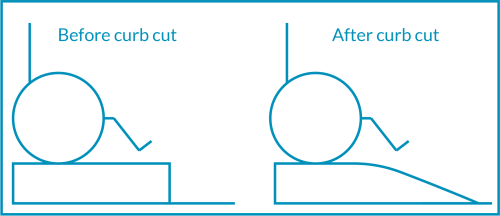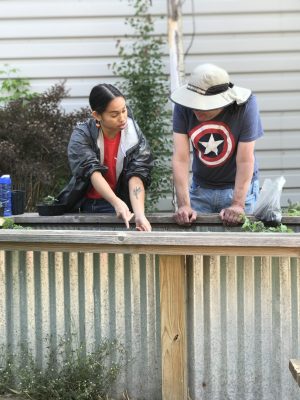Social connection is a main goal of the Eco3 Urban Farm. We want to give people a place to gather, have fun, learn and make friends. That means the Farm needs to be a place where everyone can come and participate in activities without worrying about getting around or being comfortable. So this summer we are working on making the Farm more accessible.
Accessibility is about designing spaces, activities, and resources so that everyone can use them. Some examples include adding curb cuts to sidewalks so wheelchair users can cross the street, adding Braille to signs, including places to rest in public parks, and much more. These things are not just for people with disabilities; they help everyone! For example, curb cuts also help parents with strollers or people riding bikes. Many accessibility changes also help older adults who may use walkers or need extra time to rest. Everyone benefits when elders and people with disabilities can get around and join in activities. Communities are incomplete when some people are stuck at home!

Ecolibrium3 is excited to make the Farm more accessible. Food is something everyone needs, and so it is a great way to connect with nature and each other. When the Farm is more accessible, our community events can truly include the whole community.
Accessibility is also an important part of taking care of the environment. Some accessibility changes make it easier for us to pollute less. For example, when people can buy groceries in their neighborhood, they don’t have to drive as much. Planting more trees helps clean the air, which also helps people with health problems. And social connection is a part of environmental work as well. When people know their neighbors, they can help take care of each other during big storms or floods. To make our community sustainable, we need to include everyone, especially elders and people with disabilities.
The Farm team has been working with the Duluth Age-Friendly Initiative on accessibility. Making spaces age-friendly has a lot to do with making them accessible to people with disabilities as well. To make the Farm accessible, we need to learn and plan before we start any construction. It won’t work if we build something first, and then try to change it later. That means we need to research lots of different options, so we know what works for lots of different people.

It is important to meaningfully involve people with disabilities in the design process for community spaces, because they are experts in their experiences and what they need. People are all different from each other, so we all need different things to be comfortable. That’s why it’s so important to ask lots of different people what helps them enjoy the Farm, so we can make sure it is a place everyone feels welcome. Udac is one local organization that has been helping with this process. Udac has supported individuals with disabilities through a variety of programs since 1969. Udac staff members have shared their knowledge as local experts on accessible urban gardening, touring the Farm and sharing their gardens with us as well. By sharing ideas and asking questions, we can work on designing the Farm together.
One of the first accessibility projects at the Farm is building raised garden beds. This lets people choose to sit or stand when gardening, instead of making people crouch over to reach the plants. Accessibility is about adapting spaces for people, rather than adapting people to the space.
Grants from AARP and the Minnesota Department of Agriculture are supporting many aspects of this work. The Minnesota Department of Agriculture AGRI Urban Agriculture grant supports design sessions, partnerships, and more. The AARP grant is helping fund construction of raised bed gardens. AARP’s Creating Community Gardens project has free print materials anyone can use to start similar projects.
The Farm is also hoping to make bigger changes to increase accessibility. Staff members have been researching U-shaped garden beds, which would make plants easier to reach from a seated position. Adding shade and quiet spaces would give people a place to calm down if they feel overwhelmed. Permanent ramps in and out of the high tunnels will help people that use wheelchairs or walkers, and make it easier to use wheelbarrows. Adaptive gardening tools can make working more comfortable. The pathways could be improved so it is easier to use a wheelchair or walker, without changing the way rain runs across the ground. Many of these tools and designs could also work for at-home gardening. We hope people can come to the Farm and try things out, to see if they might want one of their own at home.
The activities at the Farm will also be made more accessible. Ecolibrium3 hopes everyone will enjoy coming to the Farm, whether they are there to plant seedlings, make art, or tell stories. The most important thing is for people to enjoy the Farm, whether or not they are expert gardeners. We can all enjoy the process of trying to grow things and learning together, without worrying about how the plants will look at the end of the summer!
So please come share your time, your stories, and your point of view with us at the Farm! We’d love your help designing the space. Tell us how gardening might be made more comfortable for you, and how we can help! Whether you come to share your gardening ideas, or just to spend time with us, we can’t wait to see you.
Saturdays at the Farm runs all summer long, every Saturday from 10 am to 3 pm. Families are invited to join us at 1 pm for family-forward activities and learning. Bring closed-toed shoes, sun protection, water, and snacks! See you there!
The Eco3 Farm has been made possible due to the generousity of the Duluth Superior Area Community Foundation, Essentia Health, and the AARP. Farm development assistance has been provided by the USDA.